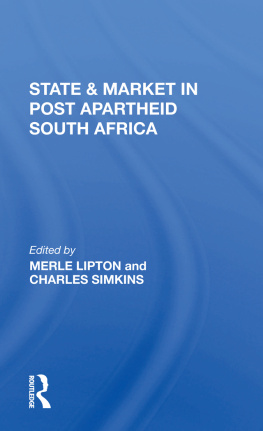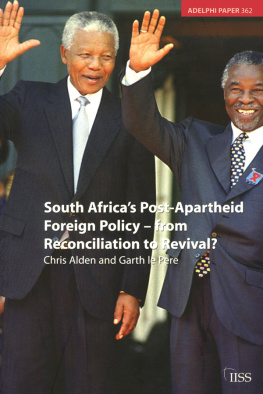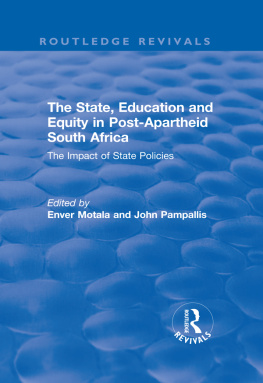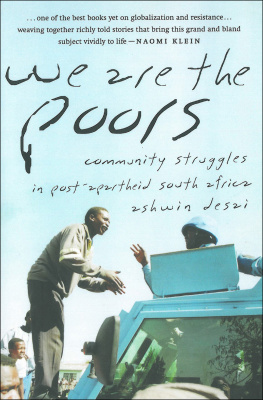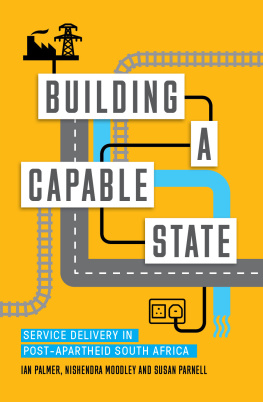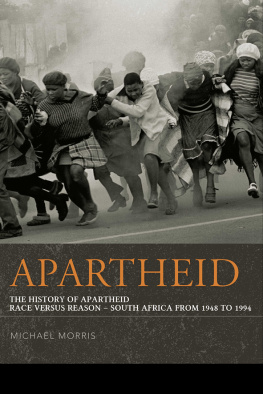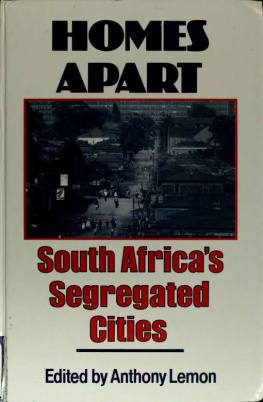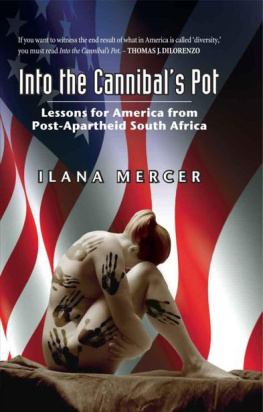Merle Lipton - State & Market in Post Apartheid South Africa
Here you can read online Merle Lipton - State & Market in Post Apartheid South Africa full text of the book (entire story) in english for free. Download pdf and epub, get meaning, cover and reviews about this ebook. year: 1993, publisher: Witwatersrand University Press, genre: Politics. Description of the work, (preface) as well as reviews are available. Best literature library LitArk.com created for fans of good reading and offers a wide selection of genres:
Romance novel
Science fiction
Adventure
Detective
Science
History
Home and family
Prose
Art
Politics
Computer
Non-fiction
Religion
Business
Children
Humor
Choose a favorite category and find really read worthwhile books. Enjoy immersion in the world of imagination, feel the emotions of the characters or learn something new for yourself, make an fascinating discovery.
- Book:State & Market in Post Apartheid South Africa
- Author:
- Publisher:Witwatersrand University Press
- Genre:
- Year:1993
- Rating:5 / 5
- Favourites:Add to favourites
- Your mark:
- 100
- 1
- 2
- 3
- 4
- 5
State & Market in Post Apartheid South Africa: summary, description and annotation
We offer to read an annotation, description, summary or preface (depends on what the author of the book "State & Market in Post Apartheid South Africa" wrote himself). If you haven't found the necessary information about the book — write in the comments, we will try to find it.
State & Market in Post Apartheid South Africa — read online for free the complete book (whole text) full work
Below is the text of the book, divided by pages. System saving the place of the last page read, allows you to conveniently read the book "State & Market in Post Apartheid South Africa" online for free, without having to search again every time where you left off. Put a bookmark, and you can go to the page where you finished reading at any time.
Font size:
Interval:
Bookmark:

52 Vanderbilt Avenue, New York, NY 10017
2 Park Square, Milton Park, Abingdon, Oxon OX14 4RN
Product or corporate names may be trademarks or registered trademarks, and are used only for identification and explanation without intent to infringe.
- vi
- vii
Department of Politics
University of Natal
O Box 375
3200 Pietermaritzburg
Department of Economics
Rhodes University
6140 Grahamstown
School of Economics
University of Cape Town
Private Bag
7700 Rondebosch
Department of Economics
University of Natal
O Box 375
3200 Pietermaritzburg
Department of Economics
Rhodes University
6140 Grahamstown
University of Cape Town and Davis, Borkum, Hare & Co.
8000 Cape Town
Department of Mathematics
University of Cape Town
Private Bag
7700 Rondebosch
School of African and Asian Studies
Sussex University
Brighton, UK
Investment Economic Research
S A Mutual
O Box 878
8000 Cape Town
Department of Business Economics
University of the Witwatersrand
O Wits 2050
Department of Economics
University of the Witwatersrand
O Wits 2050
- * Macroeconomic management, including monetary and fiscal policy, exchange rate policy and regulation of the financial system.
- * Management of South Africa's international economic relations, including extensive controls over flows of goods, capital and technology.
- * Development and operation of the national physical infrastructure: public utilities such as roads, railways, harbours, airways, posts and telecommunications, electricity and water, were established, owned and operated by the state.
- * Controls over capital and over property markets: in addition to the usual provisions for regulating ownership, title deeds, contracts, and so forth, the racial ordering imposed on most aspects of South African society in terms of the apartheid, or 'separate development' policy laid down special racial provisions for the ownership of properties and businesses and the location of housing and factories. This required the establishment of segregated residential areas for each of the officially defined 'races' or 'population groups' - whites, coloureds, Indians and Africans or blacks. The policy also required the decentralisation, wherever possible, of factories employing blacks away from the major white urban centres to the 'homelands' or Bantustans, to which blacks supposedly belonged.
- * The promotion of industrialisation, within a framework of protection and import substitution. This was undertaken by the establishment of productive state-sector industries, such as the Iron and Steel Corporation (ISCOR), and by using the Industrial Development Corporation (IDC) to initiate or encourage the establishment of a wide range of industries in which the state sometimes took a direct share. Later, parallel organisations were established for the other 'races', such as the Coloured and Xhosa Development Corporations and the Development Bank of Southern Africa (DBSA). A significant sub-sector of industrial development was the nurturing of 'strategic industries', including armaments, nuclear power, diesel engines, oil and computers, as international sanctions were first threatened and later imposed on South Africa (because of its racist policies).
- * Regulation of agriculture: controls over the allocation of land (reserving almost 86 per cent of South Africa for white ownership); over the subdivision of land (favouring largescale farming); and the regulation of most agricultural production and marketing. All this involved the establishment of an extensive network of controls and institutions, including numerous marketing boards and the Land Bank. Here, too, 'separate' institutions were established for the other races such as the South African Development Trust and the agricultural development corporations for each of the ten Bantustans.
Font size:
Interval:
Bookmark:
Similar books «State & Market in Post Apartheid South Africa»
Look at similar books to State & Market in Post Apartheid South Africa. We have selected literature similar in name and meaning in the hope of providing readers with more options to find new, interesting, not yet read works.
Discussion, reviews of the book State & Market in Post Apartheid South Africa and just readers' own opinions. Leave your comments, write what you think about the work, its meaning or the main characters. Specify what exactly you liked and what you didn't like, and why you think so.

